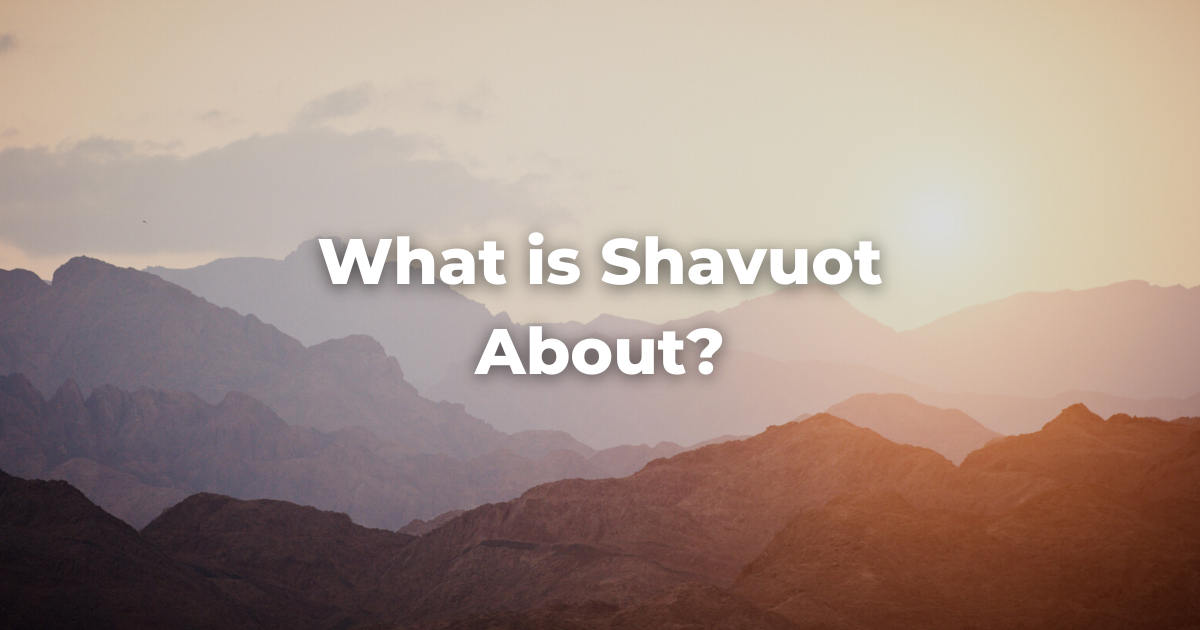Shavuot falls on the sixth and seventh days of the Hebrew month of Sivan. (The festival is observed only on the sixth of Sivan in Israel.) Like Sukkot and Passover, it is a multi-dimensional holiday, embracing profound historical, spiritual, and agricultural aspects.
Agricultural
From the agricultural perspective, Shavuot marks the end of the counting of the omer that began on Passover, but it is also referred to in the TorahRefers to the first five books of the Hebrew Bible, the Tanakh, also called the Five Books of Moses, Pentateuch or the Hebrew equivalent, Humash. This is also called the Written Torah. The term may also refer to teachings that expound on Jewish tradition. Read more at Numbers 28:26 as yom ha-bikkurim (the day of first fruits) and at Exodus 23:16 as hag ha-katzir, the harvest festival. In Israel, especially on the agricultural kibbutzim, much has been made of this aspect of the festival, and elaborate ceremonies involving the first fruits of the harvest season have been developed.
Outside of Israel, many synagogues attempt to incorporate this theme by adorning their sanctuaries with flowers or other symbols of the fertile earth.
Historical
The historical dimension of the festival has to do with the receiving of the Torah at Mount Sinai, which, according to tradition, took place on the sixth day of Sivan. This theme is especially prominent liturgically, as Shavuot is repeatedly called z’man mattan torateinu (the time of the giving of our Torah).
Spiritual
Spiritually speaking, Shavuot is the festival of revelation. Emet Ve-Emunah: Statement of Principles of Conservative Judaism (New York: The Jewish Theological Seminary of America and The Rabbinical Assembly, 1988), opens with the words, “We believe in God. Indeed, Judaism cannot be detached from belief in God. Conservative Judaism affirms its belief in revelation, the uncovering of an external source of truth emanating from God.” It goes on to explain that
the single greatest event in the history of God’s revelation took place at Sinai, but was not limited to it… Some of us conceive of revelation as the personal encounter between God and human beings. Among them there are those who believe that this personal encounter has propositional content— that God communicated with us in actual words. For them, revelation’s con- tent is immediately normative, as defined by rabbinic interpretation. The commandments of the Torah themselves issue directly from God. Others, however, believe that revelation consists of an ineffable human encounter with God. The experience of revelation inspires the verbal formulation by human beings of norms and ideas, thus continuing the historical influence of this revelational encounter. Others among us conceive of revelation as the continuing discovery, through nature and history, of truths about God and the world. These truths, although always culturally conditioned, are nevertheless seen as God’s ultimate purpose for creation. Proponents of this view tend to see revelation as an ongoing process rather than as a specific event.
These inspirational words should show the way for contemporary Jews attempting to relate to Shavuot.
However revelation is defined, Shavuot celebrates the “single greatest event” in Jewish history. Shavuot is the holiday that reminds us that faith in the truth of revelation is at the heart of all legitimate varieties of Judaism and Jewish identity.
Adapted with permission from The Observant Life.
Authors
-

The Observant Life: The Wisdom of Conservative Judaism for Contemporary Jews distills a century of thoughtful inquiry into the most profound of all Jewish questions: how to suffuse life with timeless values, how to remain loyal to the covenant that binds the Jewish people and the God of Israel, and how to embrace the law while retaining an abiding sense of fidelity to one’s own moral path in life. Written in a multiplicity of voices inspired by a common vision, the authors of The Observant Life explain what it means in the ultimate sense to live a Jewish life, and to live it honestly, morally, and purposefully. The work is a comprehensive guide to life in the 21st Century. Chapters on Jewish rituals including prayer, holiday, life cycle events and Jewish ethics such as citizenship, slander, taxes, wills, the courts, the work place and so much more.
View all posts -









